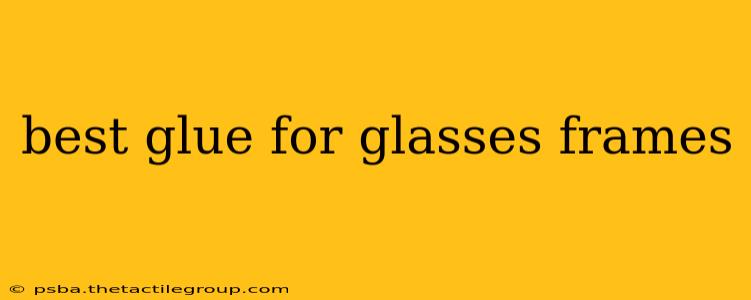Repairing broken glasses frames can be frustrating, but choosing the right adhesive is crucial for a successful and long-lasting fix. This guide explores the best glues for glasses frames, considering various materials and repair needs. We'll delve into the pros and cons of each option, helping you make an informed decision for your specific situation.
Understanding Glasses Frame Materials
Before selecting a glue, identifying your frame material is essential. Common materials include:
- Acetate: A common, durable plastic.
- Metal: Includes titanium, stainless steel, and other alloys.
- Plastic (other than acetate): Can be a variety of plastics, some more flexible than others.
- Zyl (cellulose acetate): A type of plastic known for its flexibility and durability.
Different glues work best with different materials. Using the wrong adhesive can weaken the repair or even damage the frame further.
Top Glue Choices for Glasses Frame Repair
Here's a breakdown of some of the best glues for various glasses frame repair situations:
1. Cyanoacrylate (Super Glue)
- Pros: Fast-drying, strong bond, readily available. Works well on many materials, including acetate and some plastics.
- Cons: Can be brittle, leading to re-breaks. Excess glue is difficult to clean up. Can fog lenses if not applied carefully. Not ideal for metal frames.
- Best for: Small cracks, minor repairs on acetate frames. Use sparingly and with precision.
2. Epoxy Glue
- Pros: Stronger and more durable than super glue, excellent gap-filling properties, resistant to water and chemicals. Suitable for various materials, including metal.
- Cons: Longer drying time. Requires precise mixing of two components. Can be messy if not handled carefully.
- Best for: Larger repairs, broken hinges, metal frame repairs. Provides a more robust and long-lasting fix.
3. UV Resin Glue
- Pros: Extremely strong bond, cures quickly with UV light, precise application. Suitable for various materials, including acetate and some plastics. Clear finish.
- Cons: Requires a UV light source for curing. Can be more expensive than other options.
- Best for: Precise repairs requiring a clear finish, where strength and durability are paramount. Especially good for delicate work.
4. Specialized Optical Adhesives
- Pros: Designed specifically for eyewear repairs, often offering a very strong and flexible bond. Minimizes the risk of damaging lenses.
- Cons: More expensive and harder to find than other options.
- Best for: Professionally repairing valuable frames where a high-quality, long-lasting repair is essential. Often used by opticians.
Tips for Successful Glasses Frame Repair
Regardless of the glue you choose, these tips will improve your chances of success:
- Clean the surfaces: Thoroughly clean and degrease the broken surfaces before applying glue. Use isopropyl alcohol.
- Apply sparingly: Too much glue can weaken the bond and is harder to clean.
- Clamp or secure: Hold the pieces firmly in place while the glue dries. Use clamps, tape, or other methods to ensure a proper alignment.
- Cure time: Allow sufficient drying time before using your glasses. Follow the manufacturer's instructions carefully.
- Consider professional repair: For extensive damage or valuable frames, it's best to seek professional repair from an optician.
Conclusion
The "best" glue for glasses frames depends heavily on the type of repair and the material of your frame. While super glue offers a quick fix for minor repairs, epoxy or UV resin glues may be better suited for more substantial damage. For the best results, carefully consider your specific needs and choose the adhesive that best fits the job. Remember that attempting a repair may void any warranty. Always exercise caution and consider professional repair if you are unsure about the process.

